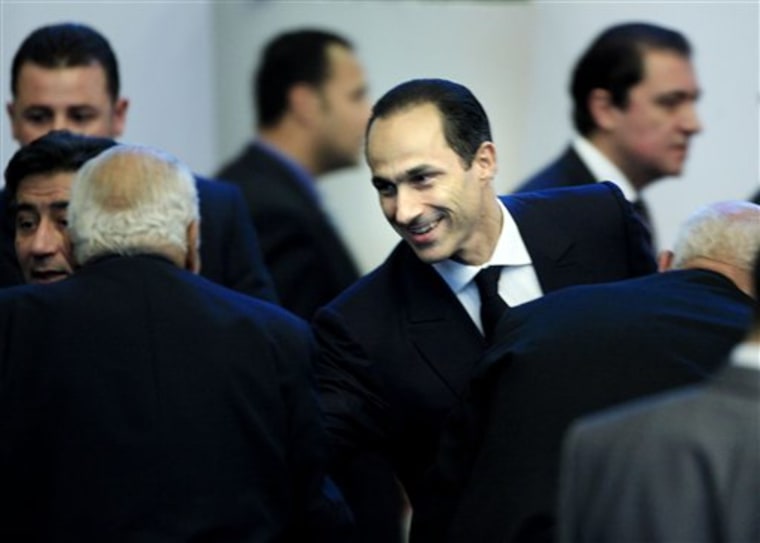The son of Egypt's president, Gamal Mubarak, said Sunday he will press ahead with bold new economic reforms that will be "more ambitious and more daring" than those that have come before, while still vowing to protect the nation's poor from any fallout.
The younger of President Hosni Mubarak's two sons, Gamal Mubarak is widely expected to succeed his father and is a senior leader in the ruling National Democratic Party, which swept recent parliamentary elections in a vote rights groups say was marred by fraud.
Gamal Mubarak is one of the main architects of a far reaching package of economic reform that helped Egypt post impressive economic growth rates over the past few years.
But the reform seems to only have widened the gap between the rich and poor and has failed to trickle down to most people, sparking a growing number of street protests over higher food prices and demands for better pay.
"We need to immediately start a second wave of reforms ... that are more ambitious and more daring. Much has been achieved but the goals are far greater," he said in an address at the party's annual conference.
Mubarak junior, a banker-turned-politician, has been closely associated with a clique of rich businessmen since his ascent through the ranks of the ruling party began a decade ago, giving many Egyptians the impression of him as a "rich boy" with little understanding of the hardships endured by the poor.
Sunday's speech sought to dispel that notion.
"The concerns, problems of Egyptians and the need to raise their standard of living will remain and continue to be our main preoccupation and the pivotal part of our party's endeavors," he said.
In the five years ahead of the next parliamentary election in 2015, he said, the party needs to create more jobs, increase non-oil exports, nearly double the number of tourists coming every year and lift a million families out of poverty.
"They are huge challenges, but we have the confidence to tackle them," he said.
Gamal Mubarak has frequently sought to debunk talk of him being groomed to succeed his 82-year-old father, but has never categorically denied it. The older Mubarak, who had surgery this year to remove his gallbladder, rarely speaks in public on the issue of succession.
Sunday's address in many ways resembled the kinds of speeches the president often gives, including one at the conference just a day before. The message was identical too — pushing ahead with reform while taking care of the poor.
Under the influence of Gamal Mubarak's reform plan, Egypt's economy grew by an annual average of 7 percent for three years until the global financial meltdown in 2008 slowed growth, but it is still expected to increase by about 6 percent in the fiscal year ending in June 2011.
That rate, however, is still short of what is required to meet the demands of the nation's 80 million people, of whom around 40 percent live on or near the internationally accepted poverty line of $2 a day.
Gamal Mubarak has routinely used the party annual conference to raise his profile in a nation ruled by men with military backgrounds since the monarchy was toppled by a coup nearly 60 years ago. His photographs have been splashed across the country's state-owned newspapers this week and the speech was broadcast live by a popular, privately owned television channel.
The younger Mubarak, however, lacks the charisma enjoyed by his father, who often departs from prepared comments to banter with lawmakers in his genial, folksy style.
In contrast, Gamal Mubarak's speech was dry and delivered in a monotone that lacked the passion and conviction — and humor — Egyptians have come to expect from their leaders.
The applause of the party faithful was lukewarm at best.
